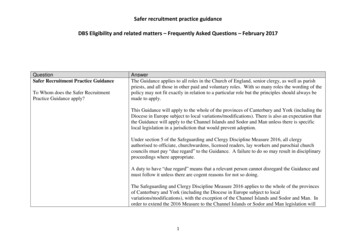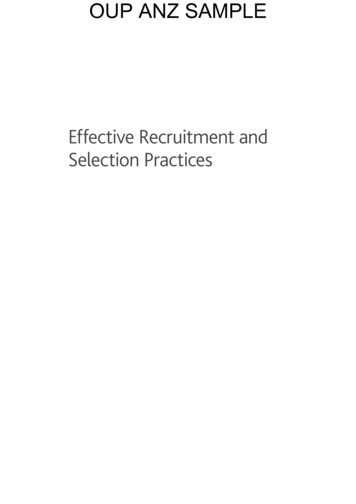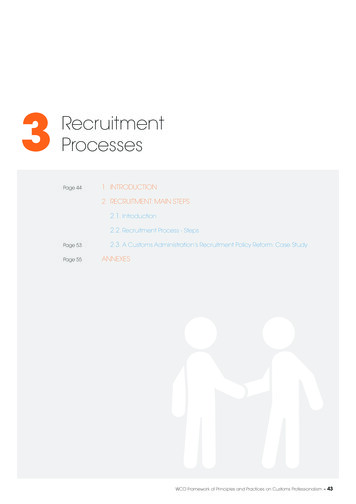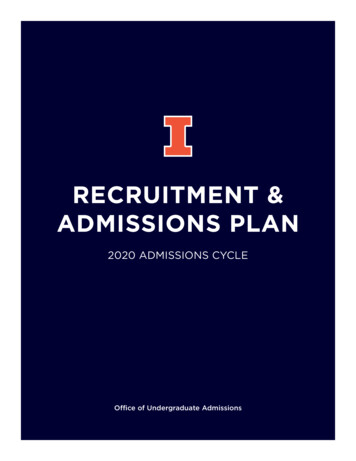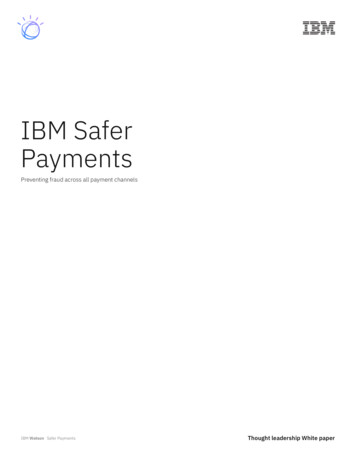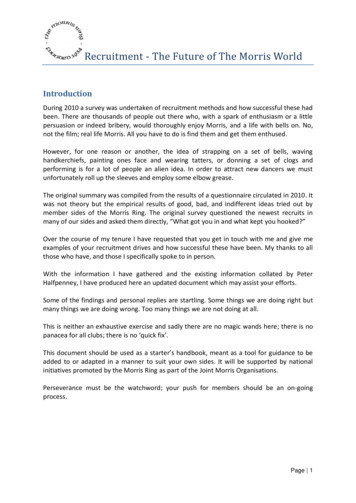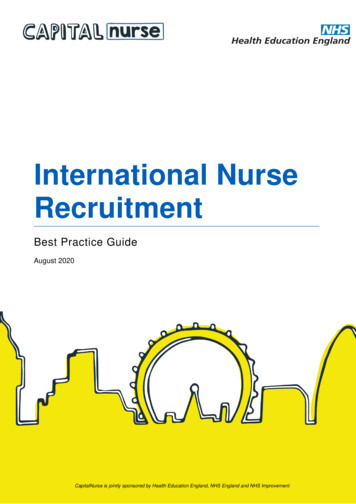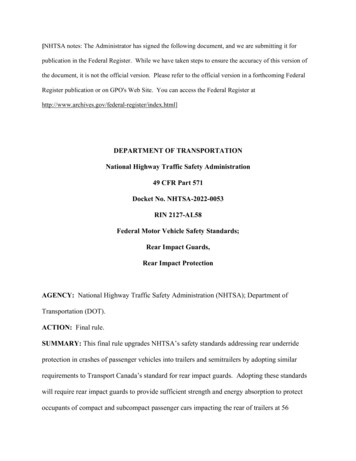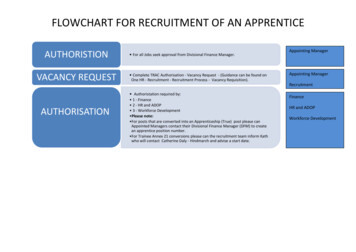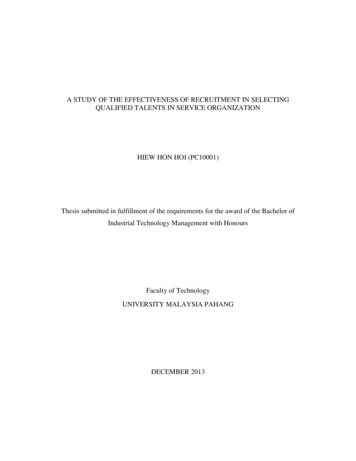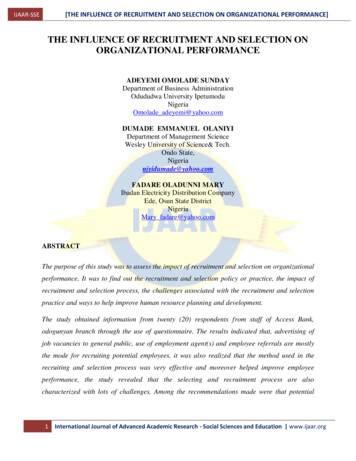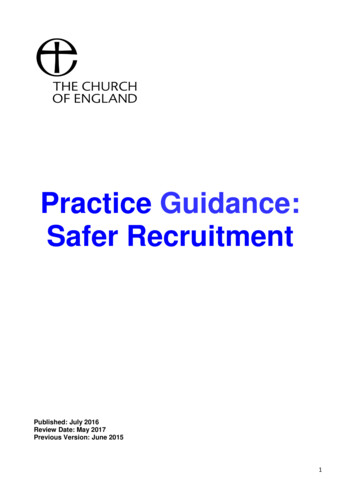
Transcription
Practice Guidance:Safer RecruitmentPublished: July 2016Review Date: May 2017Previous Version: June 20151
PrefaceThe Safer Recruitment practice guidance 2015 replaced the original joint guidanceproduced in June 2013 with the Methodist Church. It retained, at the beginning, a revisedjoint statement with the Methodist Church on safer recruitment. This update replaces andthe Safer Recruitment Practice Guidance 2015Safer recruitment practice is an essential part of the Church of England’s approach tosafeguarding. This policy and guidance sets out safer recruitment practices for peopleworking or volunteering with children and adults. The guidance addresses two key areas –the recruitment process and criminal record checks (DBS). The guidance outlines whoshould undertake a criminal record check in accordance with their role with the Church ofEngland and provides helpful templates for use within parishes, dioceses, cathedrals andother church organisations.The House of Bishops commends this policy and practice guidance for use by parishes,dioceses, cathedrals and the National Church Institutions. Where relevant, it should alsobe applied to other Church of England Settings, for example religious communities andtheological colleges. Failure to implement and adhere to this policy and guidance mayinvalidate your insurance.I hope you find this useful in your practice.Yours in Christ's fellowship, PaulBishop Paul ButlerBishop of Durham2
ContentsPagePreface2Joint Policy Statement on Safer Recruitment41. Introduction52. The recruitment process63. Criminal Records Checks94. Criminal Records Checks outcome105. The DBS on line update service116. DBS Portability117. Referral to the Disclosure and Barring Service12Appendix 1. Safer Recruiting in the parish - executive summary and models ofgood practice13Appendix 2. Model Volunteer Job Role15Appendix 3. Model Volunteer Application form17Appendix 4. Model Volunteer Reference form18Appendix 5. Church of England Confidential Declaration Form20Appendix 6. Model Volunteer interview / discussion24Appendix 7. What activities make a person eligible for an enhanced criminalrecord check?25Appendix 8 Church of England roles where the activity is seen to be eligible for acriminal record check29Appendix 9. . Model Volunteer Letter of appointment32Appendix 10. Statement of Safeguarding Principles33Appendix 11. Notes taken from the Church of England Model Pocket Sized Guideto Safeguarding 2014343
Church of England and Methodist Joint Policy on Safer RecruitmentJoint Policy Statement on Safer RecruitmentThe Church of England and Methodist Church are committed to the safeguarding and protection ofall children, young people and adults, and the care and nurture of children within our churchcommunities. We will carefully select, train and support all those with any responsibility within theChurch, in line with Safer Recruitment principles.This means that we will: Ensure that our recruitment and selection processes are inclusive, fair, consistent andtransparent. Take all reasonable steps to prevent those who might harm children or adults from taking up,in our Churches, positions of respect, responsibility or authority where they are trusted byothers. Adhere to safer recruitment legislation, guidance and standards, responding positively tochanging understandings of good safer recruitment practice. Produce and disseminate practice guidance on safer recruitment for both Churches, ensuringthat such practice guidance is compatible, and keep it updated. Always seek advice from human resources personnel to achieve best possible practice. Ensure training on safer recruitment practice guidance. Introduce systems for monitoring adherence to the Churches’ safer recruitment practiceguidance and review them regularly.April 2015 PaulLizBishop Paul ButlerRevd Dr Liz SmithBishop of DurhamChair Leeds DistrictJoint chairs of the joint safeguarding group4
“The danger is that too much reliance will be placed on CRB [now DBS] checks. There is aconcern that many abusers do not have convictions and no intelligence is held about them.Therefore the selection and recruitment process if properly conducted is an importantindeed essential safeguard”(The Bichard Inquiry Report 2004)1. Introduction1.1. This guidance sets out safer recruitment practices for all Church Officers1 working orvolunteering in a Church of England setting with children and young people and adultsexperiencing, or at risk of abuse or neglect2. It replaces and updates the Safer RecruitmentPractice Guidance 2015.1.2. At a national level it is the House of Bishops which approves policy and practice guidancewhere it is judged that the Church of England should have common practice across theparishes, dioceses, cathedrals, religious communities and other church organisations e.g.National Church Institutions, theological training institutions.1.3. This guidance must be followed for the appointment of all Church Officers for examplemembers of the clergy authorised to officiate, churchwardens, licensed readers, layworkers3, youth workers and parochial church councils. The Church of England is acomplex organisation with many different roles, paid as well as voluntary. As such,appointment processes may vary; nevertheless the principles and practice detailed in thisguidance should, wherever possible, be made to apply to all positions in the Church ofEngland. For the appointment of clergy it should be used in conjunction with the Guidelineson Parochial appointments 2015.1.4. The Ecclesiastical Insurance Group has made it clear that their insurance cover is onlyvalid where national safeguarding policy and practice guidance is being followed. Inaddition the Safeguarding and Clergy Discipline Measure 2016, once brought into forcelater in 2016, will require all clergy authorised to officiate; other relevant Church Officers(e.g. churchwardens) and parochial church councils to have ‘due regard’ to safeguardingpolicy and practice guidance issued by the House of Bishops. A duty to have ‘due regard’to guidance means that the person under the duty is not free to disregard it but is requiredto follow such guidance unless there are cogent reasons for not doing so.1.5. The guidance addresses two main areas the recruitment process and criminal recordschecks. The appendices offer model forms for use in parishes and other churchorganisations. It must not be forgotten that only a tiny percentage of adults who abuse get1A “Church Officer” is anyone appointed by or on behalf of the Church to a post or role, whether they are ordained orlay, paid or unpaid2A child is a person under 18 years of age. An adult is a person aged 18 or over. The Care and Support StatutoryGuidance issued under the Care Act 2014 (14.2) by the Department of Health replaces the previously used term‘vulnerable adult’ with ‘adults experiencing, or at risk of abuse or neglect’. However the term vulnerable adult isretained by the Disclosure and Barring Service (DBS) in its Guide to eligibility for DBS checks and by the Church ofEngland in its Safeguarding and Clergy Discipline Measure 2016. Section 6 of that Measure defines a ‘vulnerable adult’as a person aged 18 or over whose ability to protect himself or herself from violence, abuse, neglect or exploitation issignificantly impaired through physical or mental disability or illness, old age, emotional fragility or distress, orotherwise; and for that purpose, the reference to being impaired is to being temporarily or indefinitely impaired.3Lay worker – E7 and E8 of the Church of England Canons deal with lay workers. Lay workers can be licensed to carryout various duties as set out in Canon E7. Such duties could include, for example, leading public worship; exercisingpastoral care; evangelising and instructing people in the Christian faith and preparing them to receive the sacrament.5
caught and still fewer are convicted, so organisations must never rely solely on a criminalrecord check. Criminal record checks, although crucial, remain only one element ofsafeguarding and the safer recruitment process.1.6. Please note that this guidance does not address the additional requirements of thoseworking in schools, nor does it address the additional requirements of those working inchildcare settings which are registered with Ofsted4, and where the childcaredisqualification requirements5 apply. (Ofsted and the government provide separateguidance in these situations). It does not address settings where Care Quality Commission(CQC) 6 requires registration e.g. where personal care, nursing care and specialist heathand personal care services are provided.Where to find this Practice Guidance1.7. It will be distributed via email to all dioceses, cathedrals etc. The most up to date version ofthe policy will always be available on the Church of England website National Policy andPractice Guidance. News of updates will be included in Safer newsletter, circulated by theNational Safeguarding Team on a quarterly basis. Relevant information will be updatedonline, where the policy and associated practice guidance can be downloaded easily forlocal use, so that it is not necessary to supply large quantities of printed papers, which canbecome out of date all too quickly. Please note that the aim will be to move to a fullelectronic manual in 2017.Reviewing the Practice Guidance1.8. This guidance will be updated annually and fully revised every three years, or sooner ifchanges in the local or national safeguarding agenda require significant amendments to bemade. As part of the update process information will be collected about what works well,and what could be improved.In the meantime, where minor improvements and updates to the policy are needed theonline version of the policy will be kept updated. Please note that measures are in placethroughout the development of Safeguarding Policy and Practice Guidance (SGPPG) toensure that errors are avoided as far as possible. However, on rare occasions errors maybe found after publication of the SGPPG. These errors may not always warrant changes tothe SGPPG, in which case they will be logged for consideration when the SGPPG isreviewed for updating. If an error is found, the National Policy Working Group has agreedthe process that the National Safeguarding Team (NST) will use to determine whetherchanges are necessary. For further information please contact the NST.2.The recruitment process2.1. Finding and recruiting the right people to work with children and adults experiencing, orat risk of abuse or neglect can be difficult. What follows is a safer recruitment checklist tohelp make sure that dioceses and parishes recruit / appoint safely the most appropriatepeople as employees or volunteers. It is a criminal offence for an individual who is barredfrom working with vulnerable groups to apply for a regulated activity role7 and it is a4When to register with OfstedDisqualification under the Childcare Act 20066When to register with CQC7Church roles that are in regulated activity are referred to in Appendix 8. Always check with the DiocesanSafeguarding Adviser.56
criminal offence for an organisation to appoint a barred8 person to a regulated activityrole.2.2. Be clear about who is responsible for appointments. While there will always be localvariations, responsibility for appointing clergy and licensed or approved lay ministersnormally rests with the Bishop. Responsibility for paid posts, in the diocesan office, isusually with the Diocesan Secretary. In cathedrals the responsibility for appointments isgoverned by the Cathedrals Measure 1999 and/or the constitution of the relevantcathedral. In the case of religious communities because they are independent charitiesappointments will be governed by their constitutions. In local Churches the responsibilityfor appointments and approval of paid officers and volunteers rests with the PCC.In each case it is important that each of these bodies is clear about who is responsible forthe recruitment process. Responsibility can be delegated but it is important that the personto whom it is delegated is capable, competent and trained in safer recruitment and is alsoable to keep personal matters confidential. You must seek advice if it is unclear who hasthe responsibility for appointments.2.3. Have a policy statement on the recruitment of ex-offenders. Applicants for paid andvolunteer positions must be clear about how they will be treated if they are ex-offenders.The Disclosure and Barring Service (DBS) has published a sample policy statement on therecruitment of ex-offenders9.2.4. Ensure that there are safeguarding policies in place. The Church of England has arange of national safeguarding policies10. The joint statement of safeguarding principles,which appears in all national safeguarding policies must be used in the recruitmentprocess to ensure the applicant is aware of the safeguarding approach of the Church ofEngland. Have a clear job description or role, which sets out what tasks the applicant willdo and what skills are required. The job description or job role will also say whether it iseligible for and requires a criminal records check, and if so the level of the check (SeeSection 1) If it is a paid role this must be a formal job description / person specification. If itis a voluntary role, a simple job role may be used. A model template for a volunteer isshown at Appendix 2.2.5. Job description or role and Criminal Record Checks - In broad summary, it is thepolicy of the Church of England that all those who work regularly with children and / oradults experiencing, or at risk of abuse or neglect, including those on a rota, must have,where appropriate, an enhanced criminal record check (with / without a check of thebarred list, as appropriate). In addition, those who work only occasionally with vulnerablegroups will also be asked to apply for enhanced checks, provided they are eligible. Thosewho manage or supervise those who work with vulnerable groups and those in aleadership capacity who carry responsibility for safeguarding, will also be required toobtain enhanced check, provided they are eligible. For more details please refer to thetable at Appendix 7 and 8.2.6. Application form / references. An application form will always be necessary in a paidrole to assess the person’s suitability for the role. An application form will also be goodpractice when recruiting for a voluntary role. A model template application form for avolunteer can be found at Appendix 3. Always ask for and take up references. Askreferees specifically about an individual’s suitability to work with vulnerable people. Ensurethat you carefully examine application forms and references and make sure that the8There are two barring lists held by the DBS. One holds details of those barred from working with children and theother holds details of those barred from working with vulnerable adults.9DBS sample policy on the recruitment of ex-offenders10National Policy and Practice Guidance7
information that has been provided is consistent and the organisation is provided with asatisfactory explanation for any discrepancies and / or any gaps in an applicant’s personalhistory and / or career. If anything is unclear in the reference, contact the referee to clarifythe position. A model template reference request letter for volunteers can be found atAppendix 4.2.7. The Confidential Declaration. At the start of the process, where an individual is going towork or volunteer with vulnerable people, ask him / her to complete a ‘ConfidentialDeclaration’ which, in broad summary, asks if there is any reason why he / she should notbe working with children and adults experiencing, or at risk of abuse or neglect. It can alsohelp to identify any issues that might need resolving at an early stage. Having a criminalrecord may not necessarily be a bar to working with children or adults experiencing, or atrisk of abuse or neglect. The Diocesan Safeguarding Adviser is there to provide advice tothe person responsible for the appointment and must be contacted if an applicantdiscloses any information in the Confidential Declaration. A copy of the ConfidentialDeclaration is to be found at Appendix 5. Should the applicant not wish to complete theConfidential Declaration, which is entirely his / her choice, the application must notproceed further and must be terminated.2.8. Interview / discussion. Have a face-to-face interview or discussion with pre-planned andclear questions to assess a person’s suitability for a role. Check the ConfidentialDeclaration and the references. In paid roles (and sometimes in volunteering roles) thecandidate’s identity will need to be checked by asking him / her to bring photographic ID aswell as evidence of his / her relevant qualifications. Include questions about an applicant’svalues, attitude to working with children and adults experiencing, or at risk of abuse orneglect and motives for wanting to engage in such work. Always ask if he / she knows ofany reason why he / she should not be working with children or adults experiencing, or atrisk of abuse or neglect or if there are any pending cases / issues which could affect him /her or his / her ability to carry out the role. If the applicant discloses any matter during theinterview that relates to children and / or adults experiencing, or at risk of abuse or neglectand which may affect the applicant’s suitability for the role, then this must be referred tothe Diocesan Safeguarding Adviser for advice. A model interview / discussion template forvolunteers can be found at Appendix 6.2.9. Asking for a Criminal Record Check. If the person / chair of the interview panelconducting the interview / discussion is minded to recommend approval then the applicantmust be asked to carry out an appropriate criminal record check. A list of roles, which areeligible for, enhanced criminal record checks are outlined in Appendix 8. Specialarrangements apply to overseas applicants, (see paragraph 2.10 below). Provided theyare eligible, an enhanced criminal record check must always be required in relation topeople sent abroad to work with vulnerable groups (children or adults experiencing, or atrisk of abuse or neglect) as part of the UK recruitment process. Should the applicant notwish to apply for a criminal record check, which is entirely his / her choice, the applicationmust not proceed further and must be terminated.2.10. Overseas applicants. If a candidate/applicant etc. for a position that is eligible for a DBScheck is coming from overseas who, either has never lived in the UK or spent a period oftime (i.e. lived abroad), the person making the appointment should request an additionalcheck and ask the applicant to obtain criminality information (also known as a certificate ofgood conduct/character) from his/her relevant embassy/high commission (or police force).This means that in addition to the DBS check, the candidate/applicant must seek thisadditional check to cover the time he/she spent abroad. (Further advice can be found onthe Home Office website).1111Home Office advice on overseas applicants.8
If such information is not available from the embassy/high commission etc. or if there areconcerns about the reliability of the information provided, the person(s) making theappointment should take extra care when taking up references and checking any previousemployment record. In such cases, additional references should be sought and at leastone reference from a previous employer should be contacted by telephone as well as byletter.2.11. Approval. The decision to appoint to voluntary or paid work must be made only by thosewho have that responsibility, (see paragraph 2.2 above). The start date or appointmentmust not be confirmed until the relevant criminal record check is received and examined.While local practice may vary, most criminal record checks are received and examined bythe criminal records (i.e. DBS) administrator. Criminal record checks that are not clear (i.e.which contain information of, for instance, criminal convictions or cautions or additionalinformation such as arrests) must always be referred to the Diocesan SafeguardingAdviser for advice – see 4.4 below. All paid posts will receive a letter of appointment. It isalso good practice for volunteers to receive a letter of appointment, which can set out bothan organisation’s commitment to its volunteers and what it hopes from its volunteers. Amodel template can be found at Appendix 9. Included with the appointment letter shouldbe a copy of the “Statement of Safeguarding Principles” (see Appendix 10) and a copy ofthe “What to do if ” guidance (see Appendix 11).2.12. Induction. Employees or volunteers whose roles involve working with children and adultsexperiencing, or at risk of abuse or neglect must receive relevant safeguarding trainingfrom the Diocese after starting their role, regardless of previous experience. They mustalso attend regular updates every three years.2.13. Probationary / settling in Period. It is good practice to have a period of probation, (forinstance, 6 months) for any paid role or a settling in period for volunteers when thevolunteer and the organisation can see whether the volunteer is suited to the particularrole. During these periods relevant training can be planned and support can be arranged.In addition, regular meetings with the supervisor can be organised to discuss any issuesetc. that arise. For paid roles, at the end of the probationary period a person must beconfirmed in his / her role in writing.2.14. Supervision and regular review. All paid posts will be subject to management,supervision and appraisal. For all volunteer posts, working with children and adultsexperiencing, or at risk of abuse or neglect, it is good practice to ensure regularsupervision and conduct a review regularly, as the role requires, (e.g. annually) so thatvolunteers feel supported and issues can be discussed and/or resolved.3.Criminal Record Checks3.1. Who is eligible?There are four types of criminal record checks: Basic – This checks for unspent criminal conviction information only. This iscurrently obtained from Disclosure Scotland; Standard - This checks for spent and unspent convictions, cautions, reprimands andfinal warnings. This is obtained from the DBS. Enhanced - This includes the same as the standard check plus any additionalinformation held by local police that’s reasonably considered relevant to the rolebeing applied for. This is obtained from the DBS; and Enhanced with barred list checks -this is like the enhanced check, but includes acheck of the DBS barred lists. This is also obtained from the DBS.9
Good safeguarding practice requires those who work closely with children and / or adultsexperiencing, or at risk of abuse or neglect to have an enhanced criminal record check.The eligibility criteria for enhanced criminal record checks is complicated but put simplyone can ask “are you over 16 and does the role include activities that allow regular/substantial contact with children or adults experiencing, or at risk of abuse or neglect?” Ifthe answer is “Yes” then you may be eligible for an enhanced criminal record check.Details as regards eligibility for enhanced criminal record checks, as set out in thelegislation, can be found in Appendix 7. Information on how this relates to Church rolescan be found in Appendix 8. Those in self-help groups or family and friends arrangementsare not eligible for an enhanced criminal record check.3.2. What does it cost? Criminal record checks are free to volunteers but there is a cost forthose in employment or those training for a role where they could be paid e.g. all clergy.The DBS update service12, which ensures that DBS checks are up to date attracts anadditional annual fee, (see paragraph 5). Dioceses have their own arrangements forpaying for criminal record checks.3.3. 3.3 How long do criminal record checks last in the Church context? The House ofBishops has decided that criminal record checks must be renewed every five years.(Should there ever be a delay in obtaining the criminal record check, the person is notapproved by the Church to act and must stand down pending completion of the process).4. Criminal Record Checks outcome4.1. Only a single paper disclosure certificate is sent to the applicant as individuals haveownership over their own information. They can choose when they want to share and withwhom. Employing and volunteering organisations will not receive a copy of the certificateunless the application is in the update service and certain conditions apply.13 They willneed to ask to see the applicant’s copy if this is required. In terms of copying thecertificate and retaining copies of certificates, the DBS has stated that where an applicantprovides a copy of his / her DBS certificate to the employing or volunteering organisationthey must comply with its obligations under the Data Protection Act 199814.4.2. The electronic criminal records system. Some dioceses subscribe to a variety ofelectronic service providers which allow applicants to apply on-line and for the church toreceive the results back electronically. The electronic service is efficient and usuallyobtains the results in days rather than weeks. It electronically informs the organisation ifthe disclosure is clear or if the certificate needs to be seen, (i.e. it contains information –for instance, conviction information). (Subscribing to an electronic DBS service is a matterof choice for each diocese as there is an additional cost involved). With the electronicsystem the DBS / criminal records administrator will know when a certificate is clear andcan inform the person responsible for the appointment. In such circumstances the12References in this guidance to the “update service” are to the DBS update service only because that will be the mostrelevant service for safeguarding Under the Fifth Principle contained in the Data Protection Act 1998, it is essential to show that personal data arebeing held for a reason, i.e. processed for a purpose. If a sufficient reason cannot be shown, then the Fifth Principleimposes an obligation to get rid of the data. Thus, whilst it is possible for the applicant to provide a copy of his/hercertificate to a registered body, the registered body must be able to justify its retention of such data and once thepurpose of the processing has been exhausted, it must dispose of the certificate. Therefore, it may be possible toretain a copy of a DBS certificate for longer than 6 months but you would have to be able to justify why you are doingso, (just in case it might be useful at some point in the future would not be sufficient justification).10
certificate does not need to be seen. If a criminal record disclosure is not clear (e.g. itreveals a conviction for a criminal offence or other relevant information) see paragraph4.4 below.4.3. The paper criminal records system. In dioceses or other church organisations whichuse a paper system the DBS online tracking response will advise when a certificate hasbeen issued. How best to proceed after it is known that the certificate has been issued willbe a matter of local determination. Indeed, what might work in an urban setting may notwork in a rural one where the structures and arrangements are different. By way ofexample, what follows is an outline suggestion. The criminal record administrator, orsomeone else, locally determined, could ask the person responsible for the appointmentto contact the applicant to see if the certificate can be seen and to confirm to the criminalrecord administrator that it is clear so that the application can proceed or if the disclosureis not clear see 4.4 below.4.4. If a criminal record disclosure is not clear, the applicant will be asked to present theoriginal disclosure to the person responsible for the appointment. A copy may also berequested but please note a copy must not be requested in substitute for the original, theoriginal disclosure must always be seen. The disclosure must be cross-referenced withthe Confidential Declaration (paragraph 2.8) to see if there are any discrepancies. Thedisclosure will be passed to the Diocesan Safeguarding Adviser for a risk assessment.The Diocesan Safeguarding Adviser is qualified to identify and assess the relevance andcircumstances of offences and the risk. If the issues are complex he or she will ask forassistance from the Local Safeguarding Children or Adults Safeguarding Board. In verycomplex cases the advice of an independent specialist may be required. The DiocesanSafeguarding Adviser will make a recommendation concerning the suitability of theapplicant to the person responsible for the appointment in line with the diocese’s localarrangements. Should the applicant not wish the confidential declaration and / or thecriminal record disclosure to be seen, which is entirely his / her choice, the applicationmust not proceed further and must be terminated.5. The DBS on line update service (for full details see DBS update service)5.1. For an annual subscription applicants can have their criminal record certificate kept upto-date and take it with them from role to role. (However, if the certificate relates to workwith children and an individual’s role changes to working with adults experiencing, or atrisk of abuse or neglect, or vice versa, then a new criminal record application must bemade as the basis on which the original certificate was issued has changed.) To apply forthe update service an applicant must apply within 19 days of the criminal record certificatebeing issued. Apply at the DBS update service. The DBS update service is very useful tothose who have multiple roles where a criminal record certificate is required.5.2. The DBS update service can be very useful for organisations to check someone’s criminal
Appendix 2. Model Volunteer Job Role 15 Appendix 3. Model Volunteer Application form 17 Appendix 4. Model Volunteer Reference form 18 Appendix 5. Church of England Confidential Declaration Form 20 Appendix 6. Model Volunteer interview / discussion 24 Appendix 7. What activities make a person eligible for an enhanced criminal record check? 25
